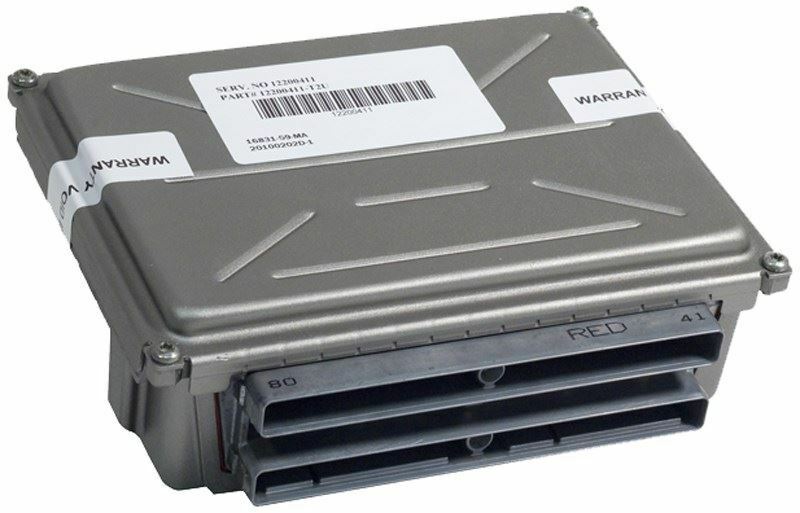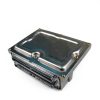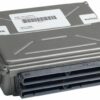Is Your GM Vehicle Running Rough, Stalling, or Showing a Check Engine Light?
If you’re driving a Buick Park Avenue, Chevrolet Impala, Pontiac Grand Prix, or another GM vehicle with the dependable 3.8L V6 engine, you know it’s built to last. However, the brain of the operation, the Powertrain Control Module (PCM), can be a common point of failure over time. A faulty PCM can lead to a host of frustrating and difficult-to-diagnose issues, leaving you stranded or with an unreliable vehicle. This replacement PCM, part number 12209624 (interchangeable with 12210234), is the definitive solution to restore your engine’s performance, reliability, and efficiency.
From the Diagnostic Bay
We had a 2002 Buick LeSabre come in with a phantom misfire that was driving the owner crazy. He had already replaced the spark plugs, wires, and even the coil packs, but the intermittent stumble and check engine light persisted. After hooking up our professional scan tool, we noticed the injector pulse width for cylinder 3 was erratic. Instead of a bad injector, we suspected the driver circuit inside the original PCM was failing. We installed one of our pre-programmed modules, performed the security relearn, and the misfire was gone for good. It’s a classic case where the problem isn’t the engine hardware, but the computer controlling it.
Common Symptoms of a Failing GM 3.8L PCM
- ✔ Persistent Check Engine Light (CEL) with communication codes (U-codes) or multiple, unrelated sensor codes.
- ✔ Engine stalling for no apparent reason, especially when coming to a stop.
- ✔ Rough idling, stumbling, or hesitation during acceleration.
- ✔ Noticeable decrease in fuel economy.
- ✔ Harsh, erratic, or delayed automatic transmission shifting.
- ✔ Complete no-start condition where the engine cranks but will not fire up.
- ✔ Failure to communicate with diagnostic scan tools.
Restore Peak Performance with a Programmed GM 3.8L PCM 12209624
Don’t settle for a generic, unprogrammed module from a local parts store that will require expensive dealer programming. We take the guesswork and extra cost out of the equation. When you purchase from us, you’re getting a complete, ready-to-install solution. We use your vehicle’s unique Vehicle Identification Number (VIN) to flash the module with the latest, most stable software updates directly from General Motors. This process ensures that the PCM is perfectly matched to your vehicle’s specific configuration, including its engine, transmission, and emissions equipment. This is crucial for proper engine function, transmission shifting, and overall vehicle performance.
Simple Installation Process
Physically replacing the PCM is straightforward for anyone with basic mechanical skills. It’s typically located in the engine bay, often within the air filter housing or on the driver’s side fender. After swapping the module, you will need to perform a security relearn procedure, also known as a VATS or Passlock relearn. This is a simple, 30-minute process that you can do yourself right in your driveway—no special tools required. This procedure syncs the new PCM with your vehicle’s anti-theft system, allowing the engine to start and run. We include clear instructions to guide you through this final step.
What is a PCM and what does it do?
The Powertrain Control Module (PCM) is your vehicle’s main computer. It controls all aspects of engine and transmission function, including fuel injection, ignition timing, spark, and shift points, to ensure optimal performance, fuel economy, and emissions.
Is this part truly plug-and-play?
Almost. Because we program the module to your VIN before shipping, it is ready for your specific vehicle. The only additional step required after installation is a security relearn procedure, which can be done without any special tools. This is necessary for the vehicle’s anti-theft system to recognize the new computer.
Where do I find my vehicle’s VIN?
Your 17-digit VIN can be found on your vehicle’s registration, insurance card, or on a metal plate on the driver’s side of the dashboard, visible through the windshield.
What is the difference between part numbers 12209624 and 12210234?
These are interchangeable GM part numbers for the same hardware. Our programming ensures that regardless of the number on the case, the module will function correctly for all vehicles listed in the compatibility chart.
Will this fix my vehicle’s specific problem?
This PCM is a direct solution for issues caused by a faulty module. While it resolves the vast majority of the symptoms listed above, it’s always recommended to have a proper diagnosis performed to rule out other potential issues like faulty wiring or sensors.


